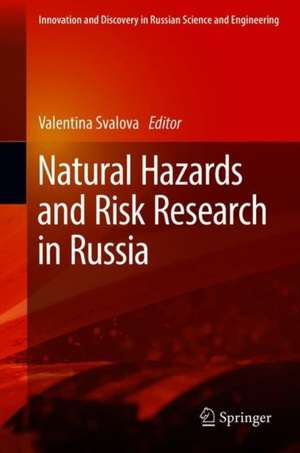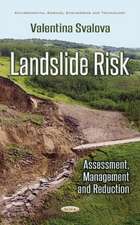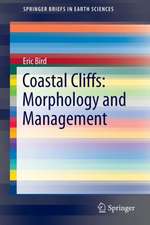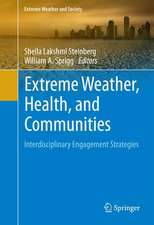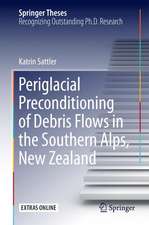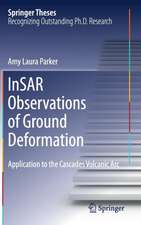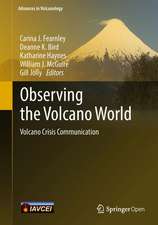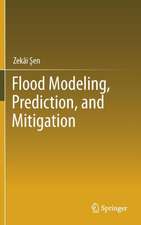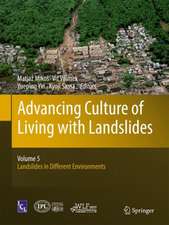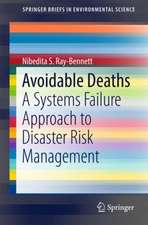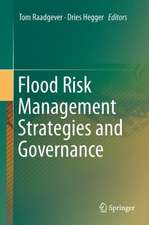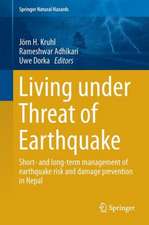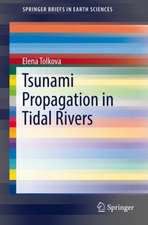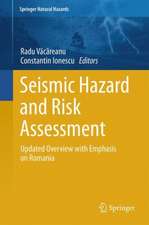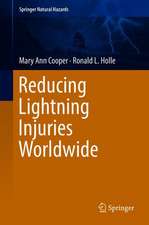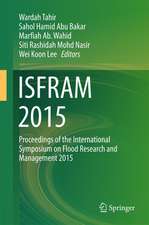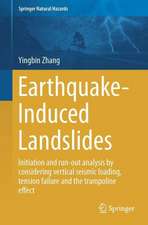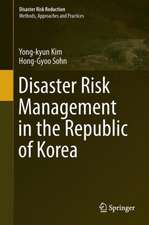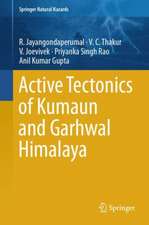Natural Hazards and Risk Research in Russia: Innovation and Discovery in Russian Science and Engineering
Editat de Valentina Svalovaen Limba Engleză Hardback – 26 iul 2018
- Maximizes reader understanding of natural hazards research and risk analysis in Russia;
- Explains relevance and application of primary tools and practices in risk study;
- Clarifies similarities and differences in fundamental concepts and principles across the discipline;
- Directs geologists, engineers, architects, planners, teachers, students, and others to authoritative sources.
| Toate formatele și edițiile | Preț | Express |
|---|---|---|
| Paperback (1) | 569.60 lei 38-44 zile | |
| Springer International Publishing – 25 ian 2019 | 569.60 lei 38-44 zile | |
| Hardback (1) | 582.50 lei 38-44 zile | |
| Springer International Publishing – 26 iul 2018 | 582.50 lei 38-44 zile |
Preț: 582.50 lei
Preț vechi: 728.12 lei
-20% Nou
Puncte Express: 874
Preț estimativ în valută:
111.47€ • 115.67$ • 93.17£
111.47€ • 115.67$ • 93.17£
Carte tipărită la comandă
Livrare economică 11-17 martie
Preluare comenzi: 021 569.72.76
Specificații
ISBN-13: 9783319918327
ISBN-10: 331991832X
Pagini: 300
Ilustrații: VII, 399 p. 207 illus., 148 illus. in color.
Dimensiuni: 155 x 235 mm
Greutate: 0.77 kg
Ediția:1st ed. 2019
Editura: Springer International Publishing
Colecția Springer
Seria Innovation and Discovery in Russian Science and Engineering
Locul publicării:Cham, Switzerland
ISBN-10: 331991832X
Pagini: 300
Ilustrații: VII, 399 p. 207 illus., 148 illus. in color.
Dimensiuni: 155 x 235 mm
Greutate: 0.77 kg
Ediția:1st ed. 2019
Editura: Springer International Publishing
Colecția Springer
Seria Innovation and Discovery in Russian Science and Engineering
Locul publicării:Cham, Switzerland
Cuprins
Chapter1: Technogenesis and natural disasters.- Chapter2: Complications and Prospects of the Hydrogeological Substantiation of Drainage in Deep Tunnels.- Chapter3: Probabilistic Approach to Forecast of the Risk Caused by Groundwater Contamination.- Chapter4: Landslide and Seismic Monitoring Systems.- Chapter5: Early-Warning Landslide Monitoring System.- Chapter6: Problems in forecasting dangerous processes and phenomena on the base of the Earth Remote sensing data.- Chapter7: Assessment and mapping geological risk for the future subsurface linear construction in Moscow.- Chapter8: Deep extrusive landslides. peculiarities of formation, development and protection.- Chapter9: The research of surface runoff in engineering-geological zoning.- Chapter10: Assessment of Seismic Hazards for Extractive Installations of the Oil and Gas Complex on the Caspian Sea Shelf.- Chapter11: Geodinamic stability of territories with specially important engineering objects.- Chapter12: Combined measures on providing safety of technogenic objects within the mined territories of potassium deposits in Perm region, Russia.- Chapter13: Geo-Environmental Sustainability of Arctic Area of The Russian Federation.- Chapter14: Geo-Environmental Zoning for Urban Planning and Design.- Chapter15: Objective methods for compiling integral maps.- Chapter16: Suture zones as upper crustal seismogenerating structures.- Chapter17: Stochastic modelling of human-induced thermokarst and natural risk assessment for existing and planned engineering structures.- Chapter18: Stochastic modelling of natural lacustrine thermokarst under stable and unstable climate.- Chapter19: Seismo - ecological monitoring of seismic and special – hazard object.- Chapter20: Landslide Risk Assessment, Management and Reduction for City Territories.- Chapter21: Mechanical-Mathematical Modeling for Landslide Processes.- Chapter22: Structural transformations of perennial frozen rocks during the Yamal Crater formation.-Chapter23: Landslide activity and landslide hazard in Geyser valley (Kamchatka peninsula, Russia).- Chapter24: The History of Slope Evolution as Primary Cause of Modern Landslide Deformations (on the example of a landslide “Vorobyovy Gory”, Moscow).- Chapter25: Application of Fractal Theory Methods for Seismogram Analysis.- Chapter26: The new method of the potentially hazardous geodynamic active zones mapping.
Notă biografică
Dr. Valentina Svalova is Leading Scientist of the Sergeev Institute of Environmental Geoscience, Russian Academy of Sciences (IEG RAS)
Textul de pe ultima copertă
This book presents natural hazards and risk--one of the fastest-growing and most relevant fields of pure and applied research within geosciences and environmental engineering—from a multi-disciplinary perspective. It examines principles, concepts, and paradigms derived from diverse research studies, and explains operational terms, materials, tools, techniques, and methods used in practice. Collecting the expertise of more than 60 scientists and expert practitioners from across Russia, this authoritative volume is ideal for the diverse range of researchers and professionals concerned with the interaction of natural hazards and the built environment.
- Maximizes reader understanding of natural hazards research and risk analysis in Russia;
- Explains relevance and application of primary tools and practices in risk study;
- Clarifies similarities and differences in fundamental concepts and principles across the discipline;
- Directs geologists, engineers, architects, planners, teachers, students, and others to authoritative sources.
Caracteristici
Maximizes reader understanding of natural hazards research and risk analysis in Russia Explains relevance and application of primary tools and practices in risk study Clarifies similarities and differences in fundamental concepts and principles across the discipline Directs geologists, engineers, architects, planners, teachers, students, and others to authoritative sources
